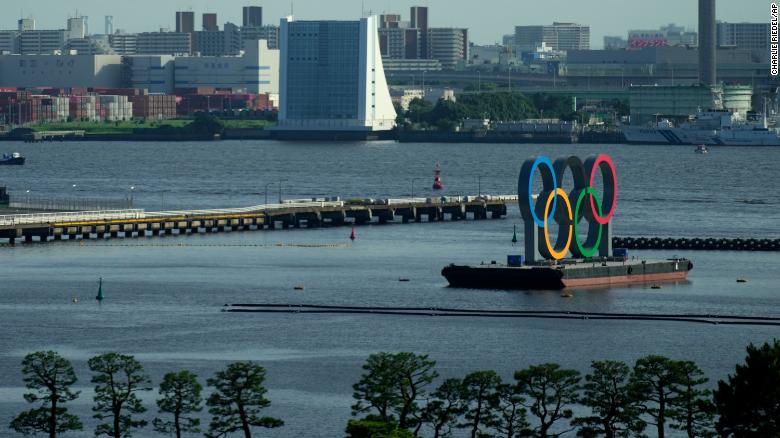Check out the 'robotic art' inspired by the Olympics 2:06
(CNN) -
Summers in Japan are hot, humid and can be deadly. If records are being broken during the tests of the Tokyo 2020 Olympic Games, a brand could also come out that perhaps you would not have wanted.
Before the pandemic, heatstroke was the greatest risk for athletes at the Tokyo Olympics, but during the first week of competitions, the heat has been aggravated by humidity values ranging from 66 to 84%, which makes the sensation of heat much greater and limits the body's ability to cool itself through sweat and evaporation.
"If you take into account not only the temperature, but also the humidity, I would say that the summer in Tokyo is the worst in the history of the Olympic Games," says Makoto Yokohari, professor of environment and urban planning at the University of Tokyo and Tokyo 2020 advisor, who spoke to CNN before the Games started.
This is what happens to your body in extreme heat
During the Olympics, temperatures have frequently reached 32.2 ° C or more, but with humidity, the feeling can be as high as 37.7 ° C.
In 2018, more than 1,000 deaths from the heat wave were registered in the country.
This year, from July 19 to 25, more than 8,000 people have been hospitalized for possible heat stroke.
The International Olympic Committee has said it has taken precautions to cope with the heat, providing water and shade at the venues.
In a statement to CNN, he said that the health of athletes is "at the center of our concerns."
In 2019, organizers moved the marathon to Sapporo to avoid oppressive weather.
But athletes in other sports are already struggling in the Tokyo sun.
Last week, Russian goalkeeper Svetlana Gomboeva was treated for heat exhaustion when temperatures reached more than 90 degrees that day.
On Wednesday, Russian tennis player Daniil Medvedev was visibly affected by the heat.
advertising
When the referee asked him if he could continue playing, he replied: "I am a fighter, I will finish the match, but I can die."
Later, he added that "I couldn't breathe well" and stated: "I think it was the wettest day we've had so far."
Olympic Games: records, surprises and curious moments in Tokyo 2020 (2021)
That same day, the Spanish Paula Badosa was forced to withdraw from her match due to heatstroke and was escorted off the track in a wheelchair.
"It was a shame to end my participation in this way," Badosa said in comments published in Tokyo 2020. "Conditions have been demanding from day one, we have tried to adapt as best we can, but today the body did not resist what was necessary."
Daniil Medvedev wonders who will take responsibility if he dies in the heat and humidity of the Tokyo Olympics.
An advert
Tennis star Novak Djokovic described the playing conditions as "brutal" after their first round match.
"I have played tennis professionally for 20 years, and I have never faced these kinds of conditions in my entire life on a continuous and daily basis," Djokovic said in comments posted by Tokyo 2020.
The International Tennis Federation has a weather emergency policy that provides athletes with two 10-minute breaks when temperatures reach dangerous levels.
On Wednesday, he also announced that the games would start later in the day.
Why does Novak Djokovic have everything to be the best tennis player in history?
Natsue Koikawa knows very well the risk of competing in very hot weather.
A former professional runner, she passed out during a marathon in Japan in 1995 and nearly died.
"Heat stroke can happen to anyone and is a very common cause of death," warns Koikawa.
It took him more than a year and a half to recover and never again participated in a major marathon.
Now a professor and athletics coach at the University of Juntendo, she investigates the dangers of competing in the heat, something that, according to her, is not always easy for athletes to recognize.
"It can be very difficult for athletes to give up competing in the middle of the game because athletes are representing their country on the stage of their dreams," he said.
"But I tell athletes that having the courage to quit is the best way to prevent heatstroke," he added.
Due to covid-19 restrictions, most athletes have less time in Japan to acclimate to weather conditions before competing.
They can only arrive at the Olympic Village five days before competing and most have to leave within two days.
The weather in Tokyo has been very hot and humid.
The future of the Summer Olympics
In 1964, the Tokyo Summer Olympics were held in October to beat the heat.
But in recent decades they are celebrated in July or August.
It is when the sports calendar is calmer, which increases the audience for the Games.
Therefore, these are the ideal months for television networks, which pay billions of dollars for rights, to show the event.
But since then, temperatures have continued to rise.
According to a report by the British Association for Sustainable Sport, temperatures in Japan have risen three times faster than the world average since 1900.
Yokohari said that these Games should have followed the same path as those of 1964.
Athletes who have had to leave the Olympic Games due to covid-19
"Holding the Olympics in the height of summer in Tokyo is not something that should be done," said Yokohari, who believes that Tokyo 2020 should have been postponed until the fall.
However, the researchers caution that the problem goes beyond Tokyo.
In 2085, most cities could be too hot for the Summer Olympics due to climate change, according to research published in The Lancet.
Looking ahead, the forecast in Tokyo is more of the same: temperatures will remain at 30-33.3 ° C for the next seven days, and may reach 33.8 ° C during the weekend.
However, according to the Japan Meteorological Agency, there are currently no heat advisories for the Greater Tokyo region.
Heat olympic games










/cloudfront-eu-central-1.images.arcpublishing.com/prisa/KMEYMJKESBAZBE4MRBAM4TGHIQ.jpg)


